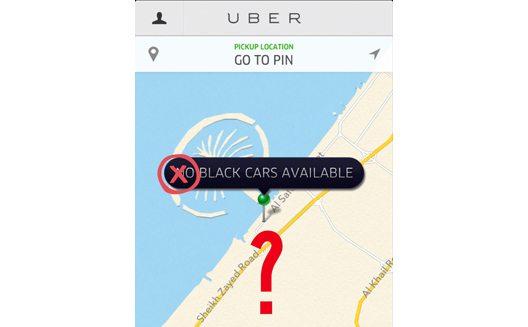Uber launches in Dubai, gives Riz Khan a ride

 UPDATE #2: Uber has now announced its launch in
Dubai, on August 27th, by offering Riz Khan a ride in a BMW
7-series.
UPDATE #2: Uber has now announced its launch in
Dubai, on August 27th, by offering Riz Khan a ride in a BMW
7-series.
UPDATE: A public filing in Delaware reported August 22nd reveals
that Uber has now taken on a new round of funding that includes $90
million in investment from private equity company TPG, and possibly
$250 million from Google Ventures, which Google CEO Larry Page
scrambled to get, AllThingsD reports. Its valuation has now
hit $3.5 billion, after being valued at $330 million only
a year ago.
Uber, the luxury car service based in San Francisco, is getting
ready to launch in Dubai. Yesterday, @Uber_Dubai confirmed the
move, tweeting “from #SanFrancisco to #Dubai, are you ready?”

The news comes as no surprise; rumors of a launch in the UAE have
been circulating since March, when Uber began seeking a general
manager.
A quick look at the company’s job listings reveals that
they’ve found a GM for Dubai, but are still seeking an operations
manager and a community manager, which its Twitter account also
mentioned Monday, after responding earlier in the week to one fan’s
anticipation of their Dubai debut.
Uber’s job listings also reveal that, beyond the 41 cities where it currently
operates, the company also has its eye on Beirut and Doha, along
with Nairobi, Bangkok, Cape Town, Moscow, Auckland, Kuala Lumpur,
Hong Kong, Bogota, Santiago, Manila, Lima, Panama City, and
Montreal… looks like a slow year.
It’s not hard to see why it’s expanding so aggressively; the
startup has raised a total of almost $50 million to date, closing a
Series B round of $37 million in December 2011, lead by Menlo
Ventures, involving Jeff Bezos and Goldman Sachs. It’s also not
hard to see why investors like it. “It’s a killer experience,” said
Silicon Valley investor Marc Andressen, who famously explained
why software is eating the world. “Uber is ‘software
eats taxis.’”
With a model that could be easily replicated, however, Uber is
likely pushing to enter new markets and secure partnerships on the
ground before others can dominate the space; because it doesn’t own
cars or employ drivers, it will have to make a land grab for local
transportation companies.
If Uber wants to succeed in Dubai, it will also have to be
legally airtight, something it’s not known for. Since its early
days, the company been challenged by transit authorities and
taxicab commissions in San Francisco, Washington D.C., Chicago, New
York, Vancouver, and Toronto for, in most cases, not being a
registered taxi service.
(Uber’s early legal challenges were enough to cause CEO Travis
Kalanick to joke “I think
I’ve got 20,000 years of jail time in front of me” at
TechCrunch Disrupt 2011).
While the company has cleaned up its act since then, local players
continue to resist it. On Monday, the taxicab commission in
Washington D.C.
ruled that the smaller, fuel-efficient cars offered by its
UberX service were not eligible to operate as sedans.
Uber bristled in response. The regulation would “grossly restrict
competition and affordable consumer transportation options,” its
blog
post reads. “…we do not plan to take this lying down.”
Meanwhile, the company is also
battling a class action lawsuit in San Francisco, from drivers
who claim that Uber is cheating them out of tips.
Competing with Careem
In Dubai, one car service has already been, well, eating taxis with
software. Careem, which we first dubbed the “Uber
of Dubai,” was founded by Magnus Olsson, a ex-McKinsey Swede
who formerly ran his own IT consultancy for small businesses, and
Mudassir Sheikha, a Pakistani entrepreneur who joined McKinsey
after building a mobile app testing platform that was acquired by
Keynote Systems for $90 million in 2011.
Like Uber, Careem offers riders the ability to order sedans via a
mobile app, and then receive an SMS confirmation of the driver’s
arrival, and track their trip using GPS. Both services also offers
on-demand ordering; on Uber’s app, users can see the actual cars on
a map, request them, and see them starting driving to the requested
location. Careem, as well has just turned on a similar service.
Careem also doesn’t have its own fleet, but, like Uber, works with
local limousine and taxi companies who are already compliant with
local regulations. It’s now expanded to
Doha, an easy test market, the founders said, and Riyadh, where
it’s targeting women, business travelers, and religious
tourists.
If the two go head to head, Uber may be able to leverage its global
knowledge and bring its operational expertise to bear in Dubai, but
Careem will have a leg up on local partnerships.
Thus far, Careem feels confident. In July, the founders said
that it would be “great to get a world class player in the market,”
to help educate and expand the customer base. “It has not been
easy, educating the drivers to work in a market like this, getting
the limo companies on board, and educating customers on what we
do,” they said, also telling Wamda, “It's getting a little lonely
here by ourselves.”
Now the question is: who’s going to offer the best dessert? Uber
has rolled out an on-demand ice cream
truck service in 33 cities. In Dubai, Careem offered the option
of ordering cupcakes from Magnolia’s Bakery over Eid. A little
competition on this front can’t hurt.


